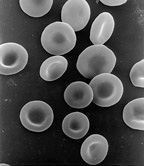 Image via WikipediaOnly 4% of us give blood, yet 96% of us rely on them for life saving operations, transfusions, after accidents and childbirth to replace lost red blood cells. It's use for chemotherapy and leukaemia treatment and to prolong the quality of life for the terminally ill.
Image via WikipediaOnly 4% of us give blood, yet 96% of us rely on them for life saving operations, transfusions, after accidents and childbirth to replace lost red blood cells. It's use for chemotherapy and leukaemia treatment and to prolong the quality of life for the terminally ill.Many of us could give blood and don't. If you're over 17 and under 65, in reasonably good health - you can give blood.
There is a simple health check that asks you a few questions before giving blood for the first time. After that you're able to give blood up to four times a year and there are regular sessions around the country. You can check on the website if you're eligible to give blood.
It's not painful, perhaps a little uncomfortable for a few minutes. You might feel a little light-headed, after donating - especially if you haven't eaten or had a drink recently. You're fine to carry on as normal, although they don't recommend heavy lifting or strenuous work. You'll replace the lost blood in
It only takes a few minutes to give your donation, although allow an hour from start to finish. You'll need to have a brief health check, answer a few questions, read the advisory leaflets and they'll check your not anaemic before you donate. If the session is busy there may be a few people in front of you. You'll also rest for few minutes after donating to make sure you're OK before you leave.
Take a book, magazine or newspaper or catch up on some reading while you're there.
It's worth a little inconvenience and an hour of your time to do something that doesn't cost you anything but could mean life or death to someone else.
Check the http://www.blood.co.uk to find your nearest blood donor session.


No comments:
Post a Comment